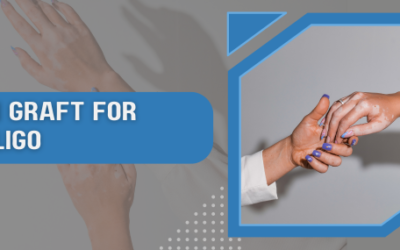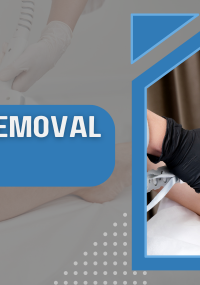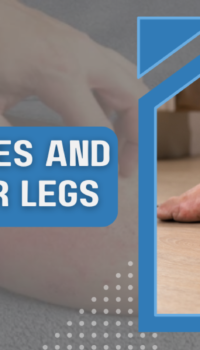Eczema Treatment in Faridabad
Eczema is a chronic skin condition that causes inflammation, redness, itching, and blisters. Around 30 million people suffer from this non-contagious disease. It is a common skin disorder in children but can happen at any age. Many children outgrow it till they reach adulthood or see great improvements in their symptoms.
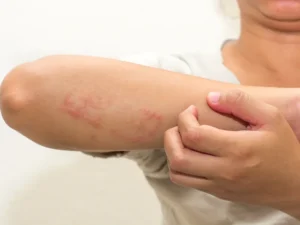
External irritants can cause eczema to flareup periodically, and they may be accompanied by hay fever and asthma. As of now, there is no permanent cure for eczema, but doctors can help manage it successfully with self-care measures and proper medications.
Dr. Archit Aggarwal is highly experienced in providing safe and effective eczema treatment in Faridabad. He is one of the most sought-after dermatologist in Faridabad for his accurate diagnosis and precise treatment plan.
He is the founder of KDC Clinic, a modern skin clinic in Faridabad known for outstanding skin, scalp, and hair treatments. It is a one-stop destination for general and cosmetic dermatology and hair transplantation. You can consult Dr. Archit Aggarwal for one of the best eczema treatment in Faridabad. He will effectively help manage the condition with appropriate medications and prevent complications.
Read on to know the different types of eczema, its symptoms, causes, and treatments.
CONTACT US FOR MORE INFORMATION OR BOOK AN APPOINTMENT
Let’s start with what are the different types of eczema?

- Atopic dermatitis – It is the most common type of eczema that causes itchy, dry skin accompanied by a red rash.
- Contact dermatitis–It occurs due to exposure to some irritant or is an allergic reaction to that substance. It causes itchiness, rashes, and redness and can be extremely uncomfortable.
- Nummular dermatitis–This chronic type of eczema appears as very itchy, red, round, scaly spots due to very dry skin or after a skin injury.
- Dyshidrotic dermatitis–It is more common in women and affects the palm, fingers, and soles. The skin has itchy tiny blisters on macerated skin pf palms & soles. It is often associated with increased sweating of palms & soles.
- Seborrheic dermatitis–It manifests itself as itchy, red, flaky scales over the oily regions of your scalp, behind your ears, eyelids, eyebrows, and the sides of your nose.
- Stasis dermatitis – It is a chronic skin condition that primarily affects the lower legs causing itching, redness and ulcers. It’s often attributed to poor nutrition, and blood flow. Stasis Dermatitis is associated with varicose veins.
What are the symptoms of eczema?

The symptoms of eczema differ from person to person. It includes dry, itchy, flaky, rough, irritated, and inflamed skin.It generally affects the cheeks, inner elbows, arms, scalp, and back of the knees.
Other symptoms of eczema include:
- Sore skin
- Red or brown patches on the skin
- Thickened, flaky skin
- Severe itching, especially at night
- Tiny raised bumps
- Dry, cracked skin
- Broken skin oozing fluid
You should consult the doctor if:
- The symptoms are not responding to over-the-counter medications
- Your skin is peeling, blistering, or getting scaly or thick
- You notice inflammation, irritation, or pus on the skin due to infection
- Your symptoms get worse at night and hamper your sleep
Dr. Archit Aggarwal provides personalized, evidence-based eczema treatment in Faridabad. He carefully monitors your condition and helps manage it with result-oriented medical care.
What are the causes of eczema?
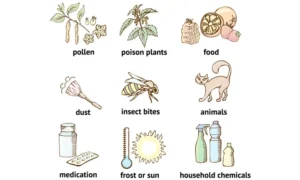
The doctors are unsure about the cause of eczema but believe it is triggered due to an overactive immune system that responds to external and internal irritants.
Given below are the common triggers for eczema flare-up:
- Synthetic fabrics
- Scratchy or rough fabrics
- Environmental irritants such as dust, pollens, dust mites, and mold
- Chemicals present in detergents and cleaners
- Food allergies
- Upper respiratory infections
- Animal dander
- Stress
- Sweating
- Change in temperature
- Allergy to metals like nickel
What are the risk factors for eczema?
The risks of developing eczema are not many. However, it is more prevalent in children and adults below 30 years who suffer from hay fever or asthma.
Further, people having a family member with eczema are more at risk.
What are the complications of eczema?
- Scarring
- Skin infection
- Lack of sleep due to severe itching
- Asthma and hay fever
- Risk of developing another type of eczema
- Thick, scaly skin
How is eczema diagnosed?
Dr. Archit Aggarwal, a competent dermatologist in Faridabad, diagnoses eczema by examining your skin and discussing the symptoms.
He may also ask you to undergo some allergy tests to verify the triggers, as many eczema patients suffer from allergies. Your treatment will depend on the type of eczema you suffer from and its severity.
What are the treatment options for eczema?
Eczema is a chronic skin condition for which you will need various treatments over a long period. Even after successfully managing it, there may be periodic flare-ups.
Dr. Archit Aggarwal recommends identifying the condition and starting with the treatment early on. If self-care methods and regular moisturizing fail to control the symptoms, he may advise the following eczema treatment in Faridabad:
1. Medication
- Your doctor will prescribe corticosteroid cream or ointment to heal the skin and control itching. However, overusing it may cause side effects, such as skin thinning.
- If there is a bacterial infection and open sores, the doctor may prescribe antibiotic cream and ask you to take oral antibiotics for a few days.
- Your doctor may prescribe oral corticosteroids for severe cases. But you cannot take this medication for long durations due to severe side effects.
- Doctors even prescribe immunosuppressants to prevent the immune system from overreacting. It helps avoid eczema flare-ups.
- There are newer FDA-approved drugs such as injectable biologics that help treat people with the severe condition and who do not respond to other treatment options.
2. Therapy Light therapy: This treatment, also called phototherapy, is for people who have frequent flare and fail to respond to medications. Here, the doctor uses ultraviolet light to prevent the immune system’s response to triggers. It is also helpful for bacterial skin infections. You will need several sessions to minimize or clear up eczema.
How to prevent eczema flare-ups?
Given below are some tips by Dr. Archit Aggarwal, an expert dermatologist for eczema treatment in Faridabad to prevent flare-ups:
- Frequently moisturize your skin
- Avoid having long showers or bath
- Do not use very hot water for bathing
- Keep your skin clean
- Do not use harsh soaps and detergents
- Try using scent and dye-free cosmetics
- Reduce stress
- Avoid rough and scratchy clothes
- Keep away from known triggers
Why choose KDC Clinic for eczema treatment in Faridabad?
- At KDC Clinic, you are assured of getting one of the best eczema treatment in Faridabad under an exceptionally proficient dermatologist, Dr. Archit Aggarwal.
- Furthermore, our clinic is fitted with state-of-the-art infrastructure and equipment to deliver results beyond your expectations.
- Our highly knowledgeable dermatologist in Faridabad believes in providing customized treatments that are scientifically approved and tested. He is well-versed in providing excellent treatment for all skin ailments, including vitiligo, pigmentation, psoriasis, keloids, etc
Customized Eczema Solutions for Every Skin
Embark on a personalized dermatological journey tailored to meet the unique needs of each individual, fostering optimal skin health for the whole family.
Advanced Acne Solutions
Clear Skin Solutions
Enhance Your Aesthetic Appeal
Comprehensive Eczema Care for You
Uncover the pinnacle of skincare with our holistic dermatology services. From diagnosis to effective treatment, we’re the ultimate solution for achieving and maintaining healthy, radiant skin amidst eczema concerns.
Frequently Asked Questions
Should eczema be kept dry or moist?
It is better to keep your skin moisturized and moist, mainly in winters when the climate can be too dry. Dry skin can trigger eczema.
Which foods should I avoid if I have eczema?
The foods given below may trigger an eczema flare-up:
- Soy
- Dairy
- Tomatoes
- Citrus fruits
- Wheat or gluten
- Eggs
- Specific nuts
- Spices like cinnamon, cloves, and vanilla
Is eczema fatal?
Eczema does not impact other parts of the body, nor can it kill you.
Is eczema contagious?
No, eczema is not a contagious disease. It does not spread to other people.
CONTACT US FOR MORE INFORMATION OR BOOK AN APPOINTMENT
Dr. Archit Agarwal's Dermatology Success Stories
CONTACT US FOR MORE INFORMATION OR BOOK AN APPOINTMENT
Recent Posts
Skin Graft For Vitiligo
Skin graft for vitiligo is a medical treatment that transfers skin from one part of the body to...
Laser Hair Removal Myths
Laser hair removal has become a popular method for eliminating unwanted facial hair and body hair....
Swollen ankles and rash on lower legs
Swollen ankles and rash on lower legs can be an uncomfortable and concerning condition that...


























